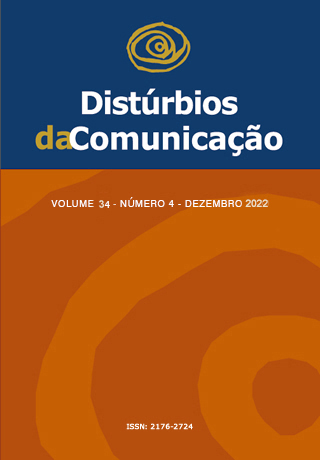Características da comunicação oral e escrita em sujeitos adultos moradores de instituições de longa duração
DOI:
https://doi.org/10.23925/2176-2724.2022v34i4e56668Palavras-chave:
Saúde mental, Idosos, Instituição de Longa Permanência para IdososResumo
Introdução: A necessidade de modificar a concepção da sociedade com relação aos sujeitos com transtorno mental e reinseri-los em espaços sociais fica cada dia mais evidente, principalmente quando passam a viver em uma instituição de longa permanência (ILP). Objetivo: Caracterizar diferentes formas pelas quais indivíduos moradores de uma ILP se comunicam, expressando a sua singularidade através da mediação da linguagem oral e escrita durante a realização de oficinas. Métodos: Estudo qualitativo descritivo. Utilizou-se o Mini Exame do Estado Mental (MEEM) para rastreio inicial e realizaram-se oficinas de linguagem oral e escrita com os residentes de uma ILP. Os dados foram registrados em um diário de campo e categorizados e exemplificados com os registros realizados. Resultados: Foram realizadas 25 oficinas, em que se buscaram as possibilidades de comunicação entre os participantes através da linguagem oral e escrita, com ênfase na estimulação das habilidades cognitivas de atenção e memória. Extraiu-se fatos que permitiram dividi-las em seis categorias, demonstrando que os sujeitos com transtorno mental podem se comunicar de diferentes formas, serem entendidos e pertencentes ao espaço que estão inseridos, proporcionando uma construção coletiva de saberes, conhecimentos e vivências. Conclusões: Através da comunicação, é possível desenvolver o cognitivo, o social e a linguagem oral, contribuindo com a melhora da qualidade de vida, valoração dos envolvidos como sujeitos sociais e históricos. Na atuação multi e interdisciplinar em ILP para pessoas adultas com transtornos mentais, a Fonoaudiologia encontra formas favoráveis para o trabalho acerca dos aspectos cognitivos e linguísticos dos sujeitos em questão.
Downloads
Referências
Amarante P, Nunes MO. A reforma psiquiátrica no SUS e a luta por uma sociedade sem manicômios. Ciênc. Saúde Colet. 2018; 23(6): 2067-74.
Martins RCA. Reformas psiquiátricas e o processo de ressignificação do trabalho na saúde mental. Rev. Nufen: Phenom. Interd. 2019;11(2): 96-116.
Brasil. Lei nº 10.216, de 6 de abril de 2001. Código Civil. Diário Oficial da União 9 abr 2001; seção 1, p.2.
ONU. Declaração Universal dos Direitos Humanos. Assembleia Geral das Nações Unidas. Brasil, Rio de Janeiro, 2009. Disponível em: Acesso em: 10 mar. 2020.
Nascimento LA, Leão A. Estigma social e estigma internalizado: a voz das pessoas com transtorno mental e os enfrentamentos necessários. História, Ciências, Saúde–Manguinhos. 2019; 26(1): 103-21.
Pretto DS, Tisott ZL, Freitas FG, Terra MG, Mello AL, Pires FB, et al. Cuidado às pessoas com transtorno mental: significados atribuídos por trabalhadores de uma instituição de longa permanência. Res., Soc. Dev. 2019; 8(11): 1-16.
DSM-V. Manual diagnóstico e estatístico de transtornos mentais. 5ª ed. Porto Alegre: Artmed; 2014.
Almeida BPB, Cunha MC, de Paula Souza LA. Speech Therapy and Mental Health: Service Group to Institutionalized Individuals with Mental Disorders. GKA revMEDICA [Internet]. 2015; 4(2).
Folstein M, Folstein S, McHugh P. “Mini-mental state”. A practical method for grading the cognitive state of patients for the clinician. J Psychiatr Res 1975; 12(3):189-198.
Brucki SMD, Nitrini R, Caramelli P, Bertolucci PHF, Okamoto IH. Sugestões para o uso do mini-exame do estado mental no Brasil.
Arq Neuropsiquiatr. 2003; 61(3-B): 777-81.
Carlomagno MC, Rocha LC. Como criar e classificar categorias para fazer análise de conteúdo: Uma questão metodológica. Revista Eletrônica de Ciência Política. 2016; 7(1): 173-88.
Santos AE, Pedrão LJ, Amorim NEZ, Carvalho AMP, Bárbaro AM. Comportamento comunicativo de indivíduos com diagnóstico em esquizofrenia. Rev. CEFAC. 2014;16(4):1283-93.
Soares SJ, Fonseca VM. Pesquisa científica: uma abordagem sobre a complementaridade do método qualitativo. Quaestio [Internet]. 2019; 21(3): 865-81.
Carvalho AFT, Peixoto ERS. Memória na Prática da Terapia Ocupacional e da Fonoaudiologia. Rio de janeiro: Editora Rubio; 2012.
Izquierdo I. Memória. 2ª ed. rev. e ampl. Porto Alegre: Artmed, 2011.
Vygotski LS. A formação social da mente. São Paulo: Martins Fontes, 1984.
Falci DM, Mambrini JVM, Costa EC, Firmo JOA, Costa MFL, Filho AIL. Uso de psicofármacos prediz incapacidade funcional entre idosos. Rev. Saúde Pública. 2019; 53(21):1-12.
Léxico. Dicionário de português onlin [Acesso em 18 abr 2020]. Disponível em: https://www.lexico.pt/associar/.
Matta APC, Chiacchio SVB, Leyser M. Possíveis etiologias da síndrome de West Avaliação de 95 pacientes. Arq neuropsiquiatr. 2007;v. 65(3): 659- 62.
Gonçalves DLC. Investigações sobre o conceito de metáfora. Revista Eletrônica de Filosofia. 2018;15(1): 83-95.
Koehler C, Gindri G, Bós ANG, Mancopes R. Alterações de linguagem em pacientes idosos portadores de demência avaliados com a Bateria MAC. Rev Soc Bras Fonoaudiol. 2012;17(1): 15-22.
Mantovani MS, Ribeiro MCP. A influência da comunicação não verbal na interação humana. Rev. Univ. Vale Rio Verde (Online). 2018; 16(2):1-10
Paes PCD. Superior psychological functions and the rooting of culture in individuality. Braz. J. of Develop. 2020; 6(7): 43489-500.
Downloads
Publicado
Edição
Seção
Licença
Copyright (c) 2023 Brunna Coutinho, Gabriel Trevizani Depolli, Larissa Bassan

Este trabalho está licenciado sob uma licença Creative Commons Attribution 4.0 International License.









